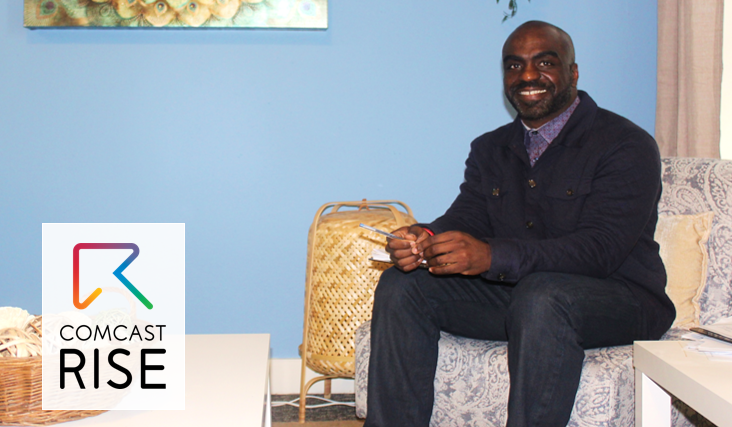R.A.A.P. and RISE: Supporting People of Color Struggling With Mental Health Issues

“I’m passionate about de-stigmatizing mental health in the Black community,” says DeShawn Williams, a licensed clinical social worker. “We don’t want to be seen as weak. No one wants to say, ‘I have a problem.’” Providing Black youth and families in Portland with mental health counseling is the mission of his business, R.A.A.P. Counseling and Consulting.
“R.A.A.P. stands for Raising An Alternative Perspective,” explains Williams, age 41. His counseling practice is one of the eight Black-owned businesses in Portland that has been awarded a Comcast RISE technology makeover. RISE was launched in October to aid BIPOC-owned small businesses hit hard by the economic impact of the pandemic. Williams hopes to use the technology to amplify the message that there are Black therapists trained to address the mental health components to racism, especially in light of the social unrest in Portland this year.
“There’s a real shortage of Black mental health practitioners in the area,” says Williams. So, in addition to serving his clients with counseling services, Williams set up his practice to enable other Black clinicians to establish their own practices in his office on NE Russell Street. “I want to help them get their practices off the ground. If you’re seeking counseling, it’s important to see someone who looks like you.”
As a Black Portlander, Williams describes racism in Oregon as “covert.” He says that the protests that erupted downtown in the wake of George Floyd’s death resulted from “raising the ante to be heard and understood.”
“Locally, no one was hearing our pain, hurt, our feelings of disrespect.” And while the protests initially provided a platform to elevate these concerns, Williams says they became infiltrated and subverted by other groups with other agendas. A reality that happens all too often when black people ask society to acknowledge the inequities they face.
It is for these reasons Williams is committed to supporting the healing of black communities from within. “I want to help our Black youth and Black families address generational stress and trauma. If, as a society, we really want to repair the rupture, then we have to start working with black people from a healing standpoint and stop just trying to fix black people as if we are the problem.”
“Being a Comcast RISE recipient leaves me feeling hopeful about the work Comcast is engaging in around race equity,” says Williams.

